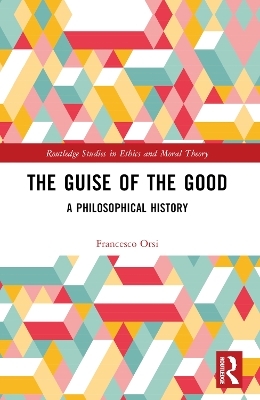
The Guise of the Good
A Philosophical History
Seiten
2024
Routledge (Verlag)
978-1-032-12230-4 (ISBN)
Routledge (Verlag)
978-1-032-12230-4 (ISBN)
This is the first book to trace the doctrine of the guise of the good throughout the history of Western philosophy. It offers a chronological narrative exploring how the doctrine was formulated, the arguments for and against it, and the broader role it played in the thought of different philosophers.
In recent years there has been a rich debate about whether value judgment or value perception must form an essential part of mental states such as emotions and desires, and whether intentional actions must always be done for reasons that seem good to the agent. This has sparked new theoretical interest in the classical doctrine of the guise of the good: whenever we desire (to do) something, we see it under the guise of the good; that is, we conceive of what we desire as good, desirable, or justified by reasons, in some way or another. This book offers a systematic historical treatment of the guise of the good. The chapters span from Ancient and Medieval philosophy (Socrates, Plato, Aristotle, Augustine, and Aquinas), through the early modern period (Hobbes, Spinoza, Locke, Hume, and Kant) and up to Elizabeth Anscombe's rediscovery in the 20th century after a period of relative neglect. Together they demonstrate how history can offer potential new models of the guise of the good—or new arguments against it—as well as to give a sense of how the guise of the good can bear on other philosophical issues.
The Guise of the Good: A Philosophical History is an excellent resource for scholars and students working on the history of ethics, philosophy of action, and practical reason.
In recent years there has been a rich debate about whether value judgment or value perception must form an essential part of mental states such as emotions and desires, and whether intentional actions must always be done for reasons that seem good to the agent. This has sparked new theoretical interest in the classical doctrine of the guise of the good: whenever we desire (to do) something, we see it under the guise of the good; that is, we conceive of what we desire as good, desirable, or justified by reasons, in some way or another. This book offers a systematic historical treatment of the guise of the good. The chapters span from Ancient and Medieval philosophy (Socrates, Plato, Aristotle, Augustine, and Aquinas), through the early modern period (Hobbes, Spinoza, Locke, Hume, and Kant) and up to Elizabeth Anscombe's rediscovery in the 20th century after a period of relative neglect. Together they demonstrate how history can offer potential new models of the guise of the good—or new arguments against it—as well as to give a sense of how the guise of the good can bear on other philosophical issues.
The Guise of the Good: A Philosophical History is an excellent resource for scholars and students working on the history of ethics, philosophy of action, and practical reason.
Francesco Orsi is Associate Professor of Theoretical Ethics at the University of Tartu, Estonia. He is the author of Value Theory (2015) and several articles on the guise of the good and the nature of value appeared in Mind, Philosophical Studies, Analytic Philosophy, and other journals.
Preface
Acknowledgments
1. Introduction
2. Socrates and Plato
3. Aristotle and the Stoics
4. The Canon in Christian Philosophy
5. The Canon Doubted and Reaffirmed (1300–1600)
6. Descartes and Spinoza: Revision and Rejection
7. Empiricism: The Guise of the Good between Desire and Pleasure
8. The Guise of the Good in Hume and Kant
9. After Kant, Before Anscombe
10. Epilogue. A Fresh Start
List of Claims
Bibliography
Index
| Erscheinungsdatum | 20.09.2024 |
|---|---|
| Reihe/Serie | Routledge Studies in Ethics and Moral Theory |
| Verlagsort | London |
| Sprache | englisch |
| Maße | 152 x 229 mm |
| Gewicht | 350 g |
| Themenwelt | Geisteswissenschaften ► Philosophie ► Ethik |
| Geisteswissenschaften ► Philosophie ► Philosophie Altertum / Antike | |
| Geisteswissenschaften ► Philosophie ► Philosophie der Neuzeit | |
| ISBN-10 | 1-032-12230-7 / 1032122307 |
| ISBN-13 | 978-1-032-12230-4 / 9781032122304 |
| Zustand | Neuware |
| Informationen gemäß Produktsicherheitsverordnung (GPSR) | |
| Haben Sie eine Frage zum Produkt? |
Mehr entdecken
aus dem Bereich
aus dem Bereich


